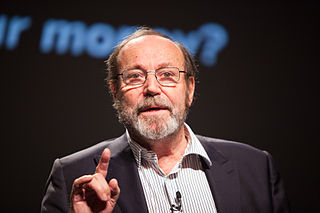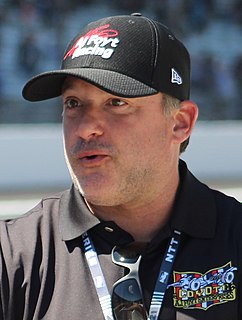A Quote by Stephen Covey
As a principle-centered person you try to stand apart from the emotion of the situation and from other factors that would act on you, and evaluate the options. Looking at the balanced whole-the work needs, the family needs, the other needs that may be involved, and the possible implications of the various alternatives - you'll try to come up with the best solution taking all factors into consideration. We are limited but we can push back the borders of our limitations.
Quote Topics
Related Quotes
Basically, for any complex to be sustainable needs to have a balance between two factors: resilience and efficiency. These two factors can be calculated from the structure of the network that is involved in a complex system. A resilient, efficient system needs to be diverse and interconnected. On the other hand, diversity and interconnectivity decrease efficiency. Therefore, the key is an appropriate balance between efficiency and resilience.
Conflicts, even of long standing duration, can be resolved if we can just keep the flow of communication going in which people come out of their heads and stop criticizing and analyzing each other, and instead get in touch with their needs, and hear the needs of others, and realize the interdependence that we all have in relation to each other. We can't win at somebody else's expense. We can only fully be satisfied when the other person's needs are fulfilled as well as our own.
Personally, I’ve gotten so that I now use a kind of two-track analysis. First, what are the factors that really govern the interests involved, rationally considered? And second, what are the subconscious influences where the brain at a subconscious level is automatically conclusions in various ways — which, by and large, are useful — but which often malfunction? One approach is rationality… And the other is to evaluate the psychological factors that cause subconscious conclusions — many of which are wrong.
The country needs and, unless I mistake its temper, the country demands bold, persistent experimentation. It is common sense to take a method and try it; if it fails, admit it frankly and try another. But above all, try something. The millions who are in want will not stand by silently forever while the things to satisfy their needs are within easy reach.
A seed depends on a whole host of factors to grow - from the fertility of the soil to the right mix of rain and sun to not being eaten by a passing bird. The same goes for an idea. For an idea to really take hold, other factors come into play, from timing to the emerging technology that makes it possible.
I think it needs to be with a heart-based wisdom and this heart-based wisdom needs to go hand in hand with science and with social activism and love for our planet and love for our whole human family that spans the whole globe and this may sound very high and mighty or airy-fairy, but it's going to have to go to that or else we're just all going to destroy each other.
One of the most effective ways to overcome anxiety is to try to shift the focus of attention away from self and toward others. When we succeed in this, we find that the scale of our own problems diminishes. This is not to say we should ignore our own needs altogether, but rather that we should try to remember others' needs alongside our own, no matter how pressing ours may be
In Cannes, I try to find somebody's apartment that I can cook at. I always go shopping in the marche and try to make a meal and set up a whole space outside the business. I'll try to go to at least two or three movies that I know there's no way in hell I'll be involved with from a business perspective. You have to indulge your cinephilic needs.



































